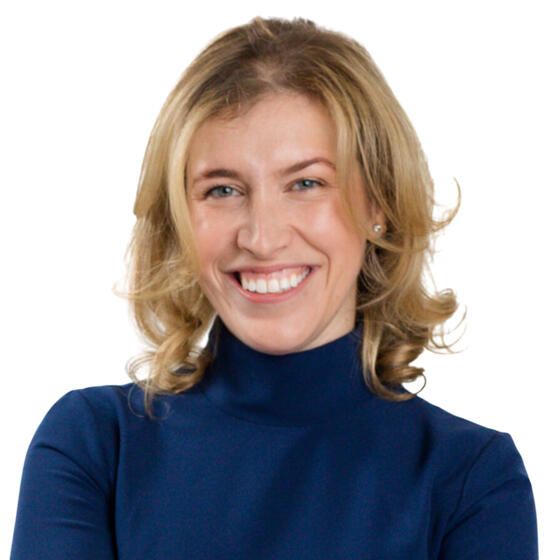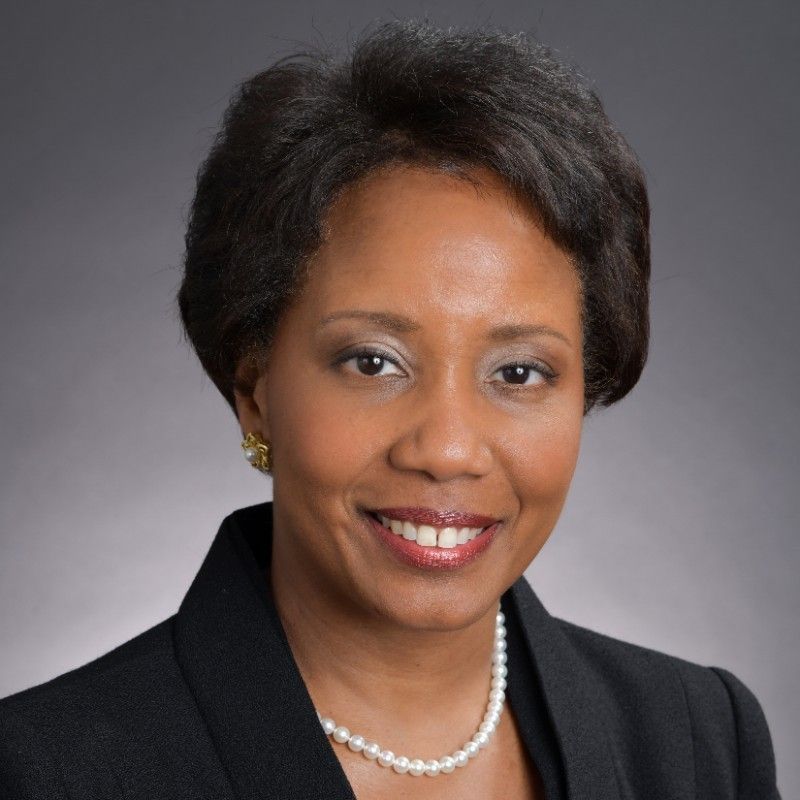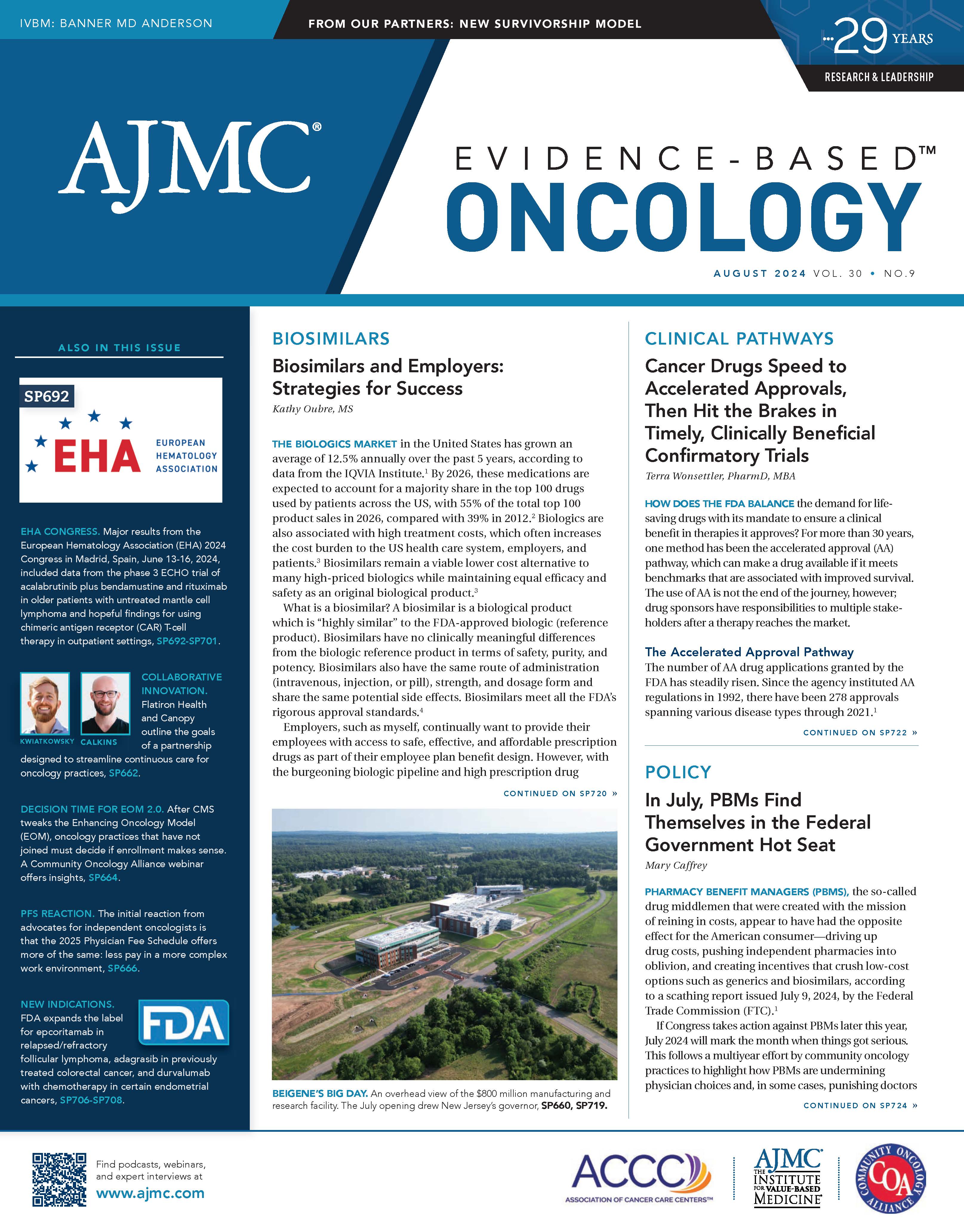- Center on Health Equity & Access
- Clinical
- Health Care Cost
- Health Care Delivery
- Insurance
- Policy
- Technology
- Value-Based Care
Building a Virtual Model for Care After Cancer
A little over 5 years ago, Hil Moss, MBA, MPH, completed 15 months of treatment for breast cancer. After being actively involved with fellow patients during treatment, Moss was struck by what she was hearing as she and fellow cancer survivors wrapped up their final chemotherapy or radiation treatments, which left them “feeling completely thrown out to the universe.”
Hil Moss, MBA, MPH | Image credit: OncoveryCare

Did they still need regular appointments with an oncologist? Perhaps not. But they needed something. And what happened if they felt a symptom that made them frightened—that seemed like their cancer was coming back?
So most fellow survivors were experiencing what Moss felt, “what I now know are called the short and late effects of cancer treatment, the physical and mental toxicities that stem treatment—but we were feeling that we no longer had a place at the cancer center.”
And yet, there wasn’t a specialist who understood their needs, who could help them move forward.
So, Moss filled the gap herself. With cofounder Justin Grischkan, MD, who is also chief medical officer, she created a company now called OncoveryCare,1 which has developed a virtual model of survivorship care—meeting a need that will be increasingly important as the ranks of cancer survivors grow. OncoveryCare cites estimates that cancer survivors in the United States will double to 22 million by 2030 from their numbers in 2008.2
Moss, who is CEO of OncoveryCare, spoke with Evidence-Based Oncology (EBO) after the company marked some major milestones in late May: it raised $4.5 million from .406 Ventures alongside the McKay Institute for Oncology Transformation at Tennessee Oncology,1 created last year within the Nashville-based practice to support innovative practice models. And OncoveryCare formed a partnership with Tennessee Oncology to eventually offer its virtual care model to patients throughout Tennessee.
Better survivorship care has attracted interest over the past decade, with clinical guideline development seen through the National Comprehensive Cancer Network (NCCN)3 and the American Society of Clinical Oncology (ASCO).4 It’s a keen interest of Tennessee Oncology CEO Natalie Dickson, MD, MMHC, FACP, who has been active in ASCO guideline development in related efforts by the Community Oncology Alliance (COA).
“By collaborating with OncoveryCare and leveraging our practice’s resources and clinical knowledge, we aim to create tailored protocols and systems to support the unique needs of the growing population of patients,” she told EBO. “Processes which should be easily adapted and implemented by practices of varying sizes and capabilities. Our initiative aligns with ASCO-COA oncology medical home certification standards, enhancing comprehensive oncology care delivery. Ultimately, this investment underscores our commitment to improving survivorship care and upholding quality and value standards, in line with the principles advocated through my work with ASCO and COA.”
Natalie Dickson, MD, MMHC, FACP | Image credit: Tennessee Oncology

Cancer survivors can experience challenges that include fatigue, cardiotoxicity stemming from certain therapies, and depression. Survivors may have complex screening and monitoring needs or may require specific follow-up protocols if they took part in a clinical trial. Yet much of survivorship care remains fragmented, creating care gaps that can cause poor outcomes.
Tennessee Oncology seeks to change this through its partnership with OncoveryCare. Once an oncologist completes the final active treatment visit, Moss said, OncoveryCare will complete an intake process with the patient, who is assigned to a virtual survivorship care team that includes a nurse practitioner, a therapist, and a navigator, with the navigator being the central point of contact. Under the model, the intake process identifies mental health needs and any physical adverse events or other toxicities that require attention.
“We have therapy protocols and offerings specifically designed for survivorship,” Moss said in the interview. “Our nurse practitioner will work with [each patient] on the appropriate referrals and management tools, and our navigator will be working to connect our survivors to local resources in their community.”
Technology will play a key role in the partnership, Dickson said. “We plan to integrate OncoveryCare’ s services into Tennessee Oncology’s workflow by utilizing our existing clinical staff to bolster their work in care coordination, counseling, and medical treatment, while also leveraging OncoveryCare’ s technology to streamline care delivery.”
Following a small pilot, Dickson said, the service will be expanded across the practice over a 6– to 12-month period.
Moss said a virtual survivorship model will offer opportunities for improved clinical outcomes as well as cost savings, as cancer survivors will be referred to the most appropriate provider, and oncologists will be freed up to treat newly diagnosed patients. Ideally, survivors who have a suspicious symptom 6 months after active treatment would contact their survivorship navigator first, instead of showing up in the emergency department, where they would be seen by a physician unfamiliar with their cancer history.
When this happens, Moss said, it can lead to an unnecessary series of tests and scans that she called the “diagnostic odyssey.”
Replacing this is OncoveryCare’ s “cutting-edge model,” which is an example of what Tennessee Oncology sought to promote when it created the McKay Institute, Dickson said.
“Through the McKay Institute, we aim to bring new ideas into our organization, bolstering technologies, innovations, and leadership crucial for the evolution of oncology care,” she said.1
References
1. Tennessee Oncology partners through the McKay Institute with OncoveryCare to raise $4.5M seed round from .406 Ventures. News release. Tennessee Oncology. May 23, 2024. Accessed July 23, 2024. https://tnoncology.com/news/oncoverycare-partners-with-tennessee-oncology-and-raises-4-5m-seed-round-from-406-ventures/
2. Cancer survivors predicted to number over 22 million in US by 2030. News release. American Cancer Society. June 11, 2019. Accessed July 23, 2024. https://pressroom.cancer.org/SurvivorshipStats2019
3. Sanft T, Day A, Ansbaugh S, et al. NCCN Guidelines insights: Survivorship: Version 1.2023. J Natl Compr Canc Netw. 2023;21(8):792-803.doi: 10.6004/jnccn.2023.0041.
Halpern M, Mollica MA, Han PKJ, Tonorezos ES. Myths and presumptions about cancer survivorship. J Clin Oncol. 2024;10;42(2):134-139. doi: 10.1200/JCO.23.00631.

